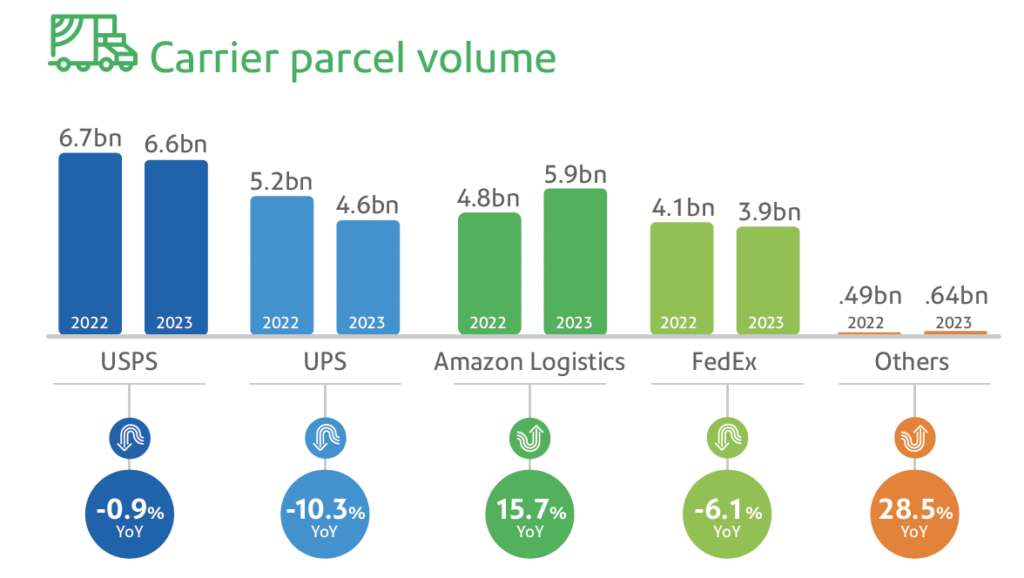Pitney Bowes Inc., a global shipping and mailing company that provides technology, logistics, and financial services, released its annual U.S. Parcel Shipping Index. The index revealed significant shifts in the carrier competitive landscape and consumer behaviors in 2023.
Of the four largest carriers (USPS, Amazon Logistics, UPS, and FedEx), only Amazon Logistics grew volumes year over year by a staggering 15.7%. One year after passing FedEx in parcel volumes, Amazon Logistics has passed UPS and is gaining momentum on market leader USPS.

Amazon Logistics and USPS experienced revenue growth, while UPS and FedEx declined in parcel volume and revenue. Meanwhile, the “others” category, comprised of smaller carriers, witnessed substantial growth in revenue and volume. Although Amazon Logistics nearly tripled its shipping volumes from 2019 to 2023 (from 2B to 5.9B), it remains fourth in market share by revenue ($28.6B), generating less than half of UPS ($68.9B) and FedEx ($63.2B), foreshadowing a secular shift in the economics of last-mile delivery towards smaller parcels and cost-effective shipping services.
“Despite the continued aftershocks of the COVID-19 pandemic, persistent inflation, and pessimistic economic perceptions, consumer spending remains resilient, primarily via a growing demand for affordable goods from global marketplaces. The result is an influx of smaller, less-expensive, lightweight packages which drive up volumes at a lower rate of revenue-per-piece,” said Shemin Nurmohamed, EVP and President of Sending Technology Solutions at Pitney Bowes.
The four largest carriers shared more of the market with smaller competitors in 2023, as “other” carriers saw their combined volumes grow 28.5%. This was underscored by a 0.5% increase (to 21.7B) in parcel volume alongside the first revenue decline in seven years (0.3% decline to $197.9B).
“The legacy players are still adapting as the delivery landscape shifts to favor natively direct-to-consumer parcel networks that are designed from the start to serve residential deliveries, such as the USPS, Amazon Logistics and specialized/localized carriers,” said Vijay Ramachandran, VP of Go-to-Market Enablement and Experience at Pitney Bowes. “While parcel volume growth has shifted from double to single digits, consumers’ appetites for ‘real-time retail,’ or affordable goods that are brought to market based on fast-moving trends, will continue to elevate parcel volumes well beyond the effects of the pandemic.”
Nurmohamed added: “As shippers gain access to an array of carrier options, multi-carrier platforms with recommendation engines help them identify and select the best carriers for their network and individual shipments, meeting customer demands efficiently and cost-effectively. It’s what Pitney Bowes is delivering for clients today.”
Source: Pitney Bowes
